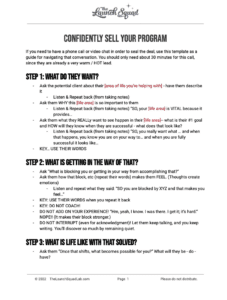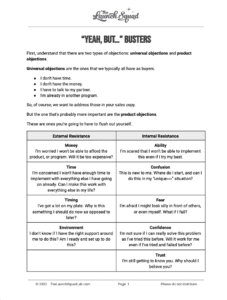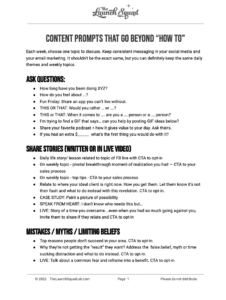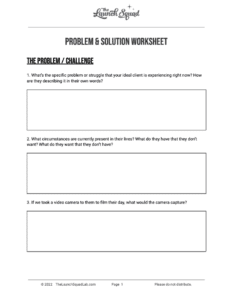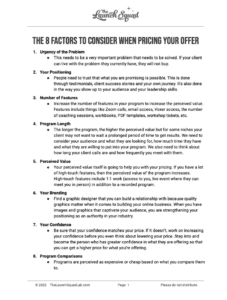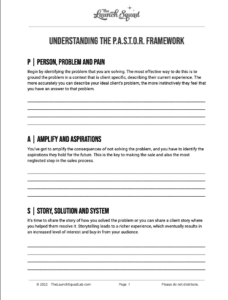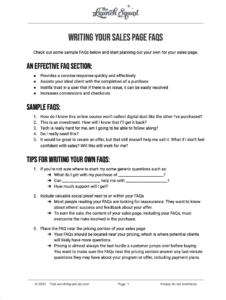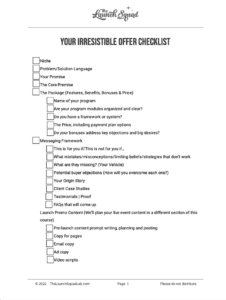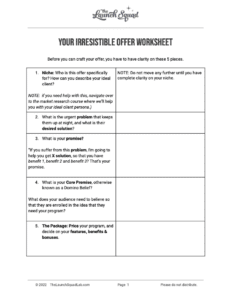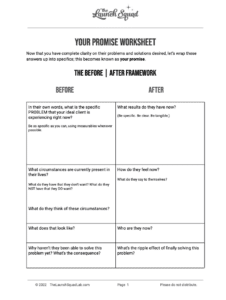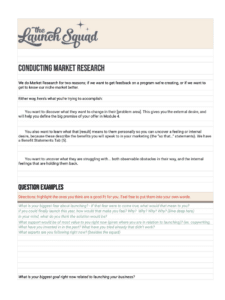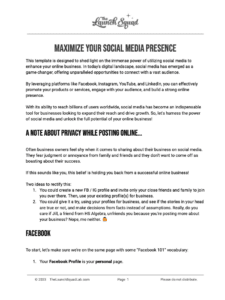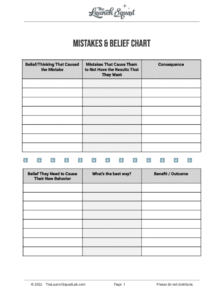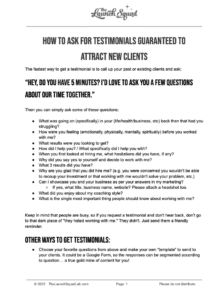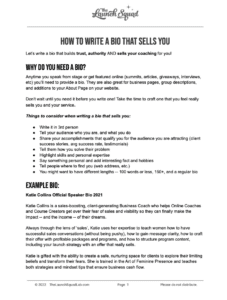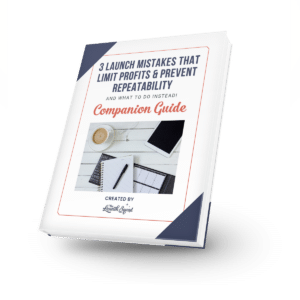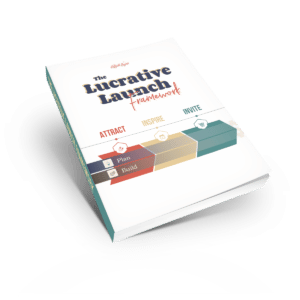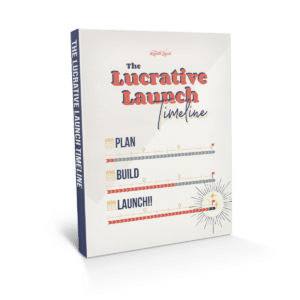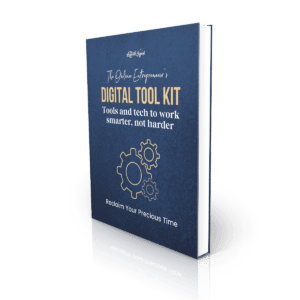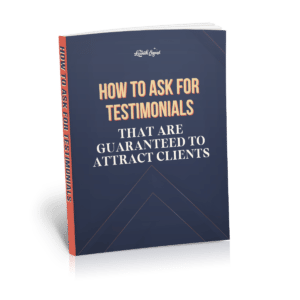Jeffrey: Welcome to the lightened glass podcast. Today, we're talking about speaking conferencing and interviewing like a boss, a stay tuned.
Jeffrey: Welcome back to the show. I'm Jeffrey, Samorano on I'm back again with Katie Collins. And today we want to talk about having a complete confidence when talking about your business, meeting the right people at conferences and having incredible interviews. Katie, would you please introduce our special guest today?
Katie: I would love to because today's guest has been a wonderful friend and colleague of mine for the past decade, which feels crazy. And I'm just delighted to have him on the show. He studied communication for his undergrad and is a skilled web design. Um, after working for a few notable companies over 15 years, he finally admitted to himself in 2005 that he's actually and proudly unemployable and has been on an entrepreneurial track ever since today.
He's the host of the award-winning podcast. The solo hour with over 10 million downloads, the solo hour landed on the iTunes top 10 business list within the first month of. He co-hosts with the best and brightest solopreneurs from all walks of life, including network marketing, internet marketing, music, fitness actors, comedians, and more, and includes such thought leaders as John Lee Dumas, pat Flynn, Ryan Levesque, and Chris Drucker.
Just to name a few. With experience and success in multi-level marketing sales, as well as online marketing, he provides business support, not only through his podcast, but also through group programs and online programs, helping you learn how to launch a, build a podcast, the art of the interview network marketing and social media training.
He's also a kick-ass MC and is often invited to take the stage at well-known conferences across the nation, because I know him personally. Fun hobbies include being a diehard Steelers fan, a freelance drummer. If that's such a thing, a vintage Porsche lover with his own restoration channel on YouTube wrench.com forward slash YouTube.
Welcome to the show, Michael O'Neill.
Michael: Hey, what's happening guys. Thank you for having me.
Katie: Yes. Yeah. We're so glad you're here. Finally.
Michael: Where did you dig? I, there was some stuff in that intro that I'm like, well, do I do with that? What, where did you dig that info out? I'm like, I haven't done network marketing stuff in 10 years.
Katie: Oh,
Jeffrey: we hired a private investigator to dig up all the.
Michael: Very
Katie: just that I've known you since 2011, so I could dig back that far in my own memory.
Michael: Right. You just knew it. You just
Katie: just knew it. Yeah.
Michael: how's the Denver these days.
Katie: Denver is a cold these days. Yeah, it is. It's actually winter now it took a little bit longer, but we are in fact in winter. So, um, which, which makes it feel normal to me.
Jeffrey: where are you?
Michael: Uh, 75 and sunny land here. And, uh, I almost said San Diego, but I'm in Long beach. now,
Jeffrey: Long beach. Okay. We're in the same
Michael: moved, I moved to, uh, I moved to long beach two days before the lockdown, um, you know, in 2020. So, and it was like this crazy. It was such a weird time, first of all, to move at all, but I didn't know anybody here at all.
So I, I assumed that my world would be the same world I've had, which is connecting with entrepreneurs and going to live events and things like that. And I had heavily leveraged 2020 on public speaking cause I was doing like public speaking MC gigs everywhere. And in fact, April, 2020, It was my biggest public speaking month that I'd ever had in my career.
And it went from being this crazy number, a number that probably 10 years prior was my entire year's salary, uh, turned into $800. Um, and, and I was moving and I, cause I knew I had this big month coming. I was like a king. I was like, I'll take this couch and I'll take this thing. And then I, and I'll turn it into nothing.
And I was like, oh, this is bad.
Katie: Oh, yeah.
Michael: yeah.
Katie: I remember that as well. For me, like March 23rd, 2020, it was like $35,000 of promise sales disappeared overnight.
Michael: Yeah, mine was just a bit, a bit more than that. And I was like, ah, so Yeah. and, and, and I think that this kind of readjustment to, uh, you know, what the next phases, whether, you know, um, whether there's more live events or they're still like, to me, live events still feel a little bit.
Katie: Yeah. Yeah.
Michael: know, I don't know what the next sort of variant, if there is one or, you know, my hope is that we can sort of normalize and then we'll be safe doing so.
Um, but who knows? I just couldn't, um, I couldn't count on it. So I've gone into a bit of a different direction with some of my stuff.
Jeffrey: I know it can't last too long because we're running out of alphabets.
Michael: Yeah, that's true. Right, We're already know. right.
I don't know what the next one is. I don't know what the P version.
Katie: Um, you know, and we're, I, that's one of the things I love about you, Michael, is like, you just have so many different interests and every time I've listened to your podcasts is solo hour. Um, you know, it's, I'm just always like blown away by all the variety of topics that you can call. You know, like, you know, about so many things and I'm like, why does he know about like, you know, I was like intimidated to do the show without Jeffrey.
Cause I'm like, oh God, if he talks cars, I don't know what to say. I'm like, mine has four wheels.
Michael: Right. Right, right.
Katie: Um,
Michael: just for clarity, the show is the solopreneur hour. It's not solo hour. I only, I only use solo hour because no one in America can spell preneur.
Jeffrey: Yeah, that's good call.
Katie: the website is so low, you can do.
Michael: hour. Yeah, So solo preneur hour. But the like the socials are at solo hour because no one can spell preneur. in America.
That's how that, yeah.
Katie: Yep. We find that.
Michael: French.
Katie: The other word that, uh, everyone has a hard time spelling, including us is irresistible. And of course, one of our course names is craft an irresistible offer that sells and everyone on our team, when we're writing the word irresistible, it's never spelled right.
It's
Michael: Yeah. I believe
Katie: Yeah.
Michael: believe that.
Katie: Um, so I, you know what, one of the things that I've always admired about you is being able to carry a conversation with anybody at any time. And that includes conferences. And so I know, I know they're going to come back. I just know it because I know so many people that just miss that in-person connection and it is the crossing of the fingers.
When is it going to be in 20, 22? We don't know, but you know, they're going to come back, but even. Attending something virtually. Um, I'm curious, and I know you have a really cool course on this, but like what do you recommend people do to really maximize. efforts. Um, like I know that I've gone to some conferences where I've been like, yes, I'm going to network with all these people.
And I actually get exhausted energetically taking in. And then another time I really looked at who was attending, if there is a way for me to find out I do this for networking meetings, who's attendance. What do I like, who do I care about? And then I pick the five people that I want to connect with, for example.
So I'm curious, what do you say to people? How do they prepare for conferences so that they get the best value?
Michael: I think a lot of us, you know, get the, whatever the general admission ticket to a conference and we just go. And we'll go, we'll take some notes and then, you know, we're kind of tired. So we go to the hotel room afterwards and then, you know, maybe go grab a bite to eat. Cause we're tired and we're in our room.
And then we come back and we do the same thing. And, and then that's it. And that's the whole conference. And maybe you had a couple of, you know, what we might call aha moments during like content wise during the presentation, but we definitely did not maximize the experience. I want to go into a conference with a, with a very clear strategy and that strategy, um, is kind of two tiered it's one.
And the F for me, the most important here are what are the two or three questions I need answered for my business? Like what these, what are the sort of, uh, mission critical things I need to answer, for example, Um, what are you, uh, what is your email funnel look like? Like how many, or how many emails a week are you sending or something very specific to your business?
That that might be good. Um, what are you doing on Tik TOK and how much or something like that. And when you have those actual ideas, like these strategies that might really help propel your. Uh, in mind, every time you have a conversation, if you ask that person those questions, if you work it into the conversation.
Well, all of a sudden you have, let's say you talk to 30 people. Now you have 30 different data points. And if 19 of them said the same thing, you go, okay, this is the, this is what I'm going to go with. Cause this is what seems to be working for people. So that's the first thing. The second one is, um, are there a couple of people, like in my world, I'm always looking for people to interview or people to commit.
And those things, you know, what did they say your network is your net worth, right? Um, so the, when you have like some of the speakers and, um, you want to connect with those people, the best thing to do is get the VIP ticket. If there's some version of that ticket that says you get to have a private dinner with the speakers or some cocktail hour, or you actually get to belly up and like talk to them.
That's always a good investment to make. If it's an extra 600 bucks or an extra grand or something, go spend that money because you're going to probably get more out of that one hour, little lounge networking thing, then you would have the entire conference otherwise, uh, not the least of which is if you're someone who was like, like me, that trying to interview.
If you can be like, Hey, would you be down to do my podcast? We've just skipped all of their, you know, their assistant and their manager and all the stuff to get to them where they might turn you down because you're a brand new show and, you know, they'd be like, yeah, that sounds great. And then you do the show and do this amazing time, you know, do this amazing interview with.
And then, you know, at the end of the show, you just go, Hey, is there anybody else you think I should talk to about this? And then you end up getting their a list or friends. So it really can, it can be a massive difference if you have that targeted idea of who you're going to talk to. So those things in and of themselves are awesome.
And then once you're there, there's, there's so many things, um, to kind of, uh, you alluded to this, but I have a free course on all of this stuff. It's called conference. And I think it works for, you know, I think it works for live conferences and virtual. Maybe not as much, I didn't participate by the way in the virtual world at all.
Like, I think I did one virtual thing and I'm like, this is stupid and I'm not doing it. And that was that like, it just was it's no, it wasn't the same for me. And it didn't have the same, you know, impact. And I was just kinda like, I'll wait until things come back. That's how I was.
Katie: Yup. Yup. Well, I, yeah, I get that. And I think, um, one of the most important things for me is, um, getting clear on my intention for attending. Like, like you said, in the beginning, a lot of people are just like, oh, it's a conference. I'm going to go. Right? Like, um, we belong to a community. Um, Once everybody, the people who paid three grand for this particular online program were then invited to the upsell event, if you will.
Um, you know, but everybody in the room has already spent $3,000 with, with this leader. And so it was just a much better experience for me than a free summit, which I've gone to a bunch of those as well. Um, but I remember not having the best experience. And I think I just wasn't clear on my intention or maybe my intention was too salesy.
Um, but I just like, it was so funny. I just couldn't like get my energy aligned. So that's why I wanted to ask that question. Like, not only just questions that you want to ask, but also just, you know, what's your intention. And coming back to that intention so that, you know, you don't go hide out in your room.
Michael: this
Jeffrey: how you mentioned, uh, the VIP aspect of it. Like a lot of things have a VIP upsell or something like that, because when, like you're saying you're when you're in the same room. From their perspective, that leader's perspective. Um, if you've paid to be in that room, you're automatically on a different, some, some sort of different level than, than the other people who are just attending.
And not only do you get access to them, but they now get to know you. They get to know you from. That perspective. And I think this might sound elitist or something, but you know, it just, it just feels like if someone's going to pay for access, then you're on a different level than a quote unquote attendee.
Michael: For sure. Yeah. You, you separate yourself from the commoners
Jeffrey: Yeah.
Michael: Um, so, uh, so regarding the conference Topia thing, sometimes I go, like, if I, if I'm at a friend's conference, I'll be like, Hey, can I jump on stage really quick and do a little 10 minute thing that I think will set the table for all the attendees?
And they're often very open to it, even though a conferences like are pretty. this is like the super reader's digest, condensed version of the conference Topia course, but it's seven quick bullet points. Can I bang those out For you guys real
Katie: do it.
Michael: So I've already talked about the two pressing questions, like two things that.
you just need answered in your business.
How do you work with a VA or bubble lot? Right? Whatever it.
is a second, my buddy clay, a bear who weirdly just texted me and I haven't heard from him in forever. As, uh, a little, uh, thing called the six word intro, which is the, um, or I don't even know how many, I guess it's I help, I help blank do blank.
Right? Maybe it's the five word intro. Um, but it's being able to, when someone goes, what are you doing? It's being able to answer that question. If you have to describe, and it takes you five minutes to like, describe what you do, not only they already clocked out, but you don't know your own brand at all.
Like you're not there yet. So you really need to have, and sometimes existence this simple can take months to answer, to really hone in on the things that you're trying to do. Um, back in, you know, Katie alluded to my, my network marketing. Uh, we have like a, a health product, like, uh, like protein shakes and things like that.
And so when someone said, what do you do? And I go, well, um, you know how, uh, everyone's fat and, and nobody knows what to eat and you know, all the food is awful. I help people. And they, and they inevitably would be like, how do you do that? And so what you're looking for with that, I help blank do blank is the permission to tell the next line, whatever that is, you know, you know what I'm saying?
So I can say, I can say something like I help people grow and scale solopreneur businesses in their underwear and be like, well, how do you, how do you do that? Like, what's the, tell me more, I want to be in my underwear, you know? Um, the other thing is great is to have, especially if you're kind of solo at a conference, if you end up sitting next to somebody and having a conversation with them, it's worth asking them, Hey, would you, would you want to kind of tag team the room, you know, and sort of go out and meet people in the room.
And when they, if they, hopefully they say, yes, you ask them, how would you like to be introduced? And then you tell them how you would like to be invited. You know what I mean? So that way you learn, I call it an intro buddy, but then you learn to introduce this person. You can say, Hey, this person has, uh, you know, this award-winning YouTube channel for blank and blank.
And they built it from scratch from this thing enough to make the, the, the intro IE, the person you're meeting be like, oh, that's interesting. Tell me more about that. Um, then I have something called the form method. This is number four. The fourth method is family occupation, recreation, motivation. And this is for the shy people out there.
They don't have, like, I don't, I don't know what to talk about. I don't know how to do this. Well, these are people that, um, these are, these are topics that everybody loves to talk about. So it's there. So, Yeah. I might be like, oh cool. You guys are in Denver. Um, as your family there, right? I'll get, tell me more, blah, blah, blah.
Then you say, well, uh, what are you doing there? What's happening in Denver? What's the story? Oh, well I'm a business coach, blah, blah. Oh, cool. And what are you doing for fun? Is it like, are you just a skier because blah, blah, blah. Oh no, I do blah, blah, blah. And then why like what, what kept you in Denver? Why are you doing what you do?
All of those things like help people on the other end, uh, make it a very easy conversation. And if you just remember for em, it's the form method, uh, that you can really talk to anybody anywhere and they don't even know you're doing it. If you, if you do it nice and smoothly and you get practice, you can do it in any bar.
You can do it in any situation and it can help shy people have conversations. Um, uh, number five magic happens at the bar. So true story. You know, after all of this stuff happens, you know, people, you go to the conference, it's over at four 30, everyone tries to like reset. So they go out to dinner and they have their big group dinners.
And all this stuff happens at six o'clock or whatever, somewhere around nine or 10 o'clock people like either exhausted and they go to bed or they end up at the lobby. They end up at the bar in the lobby. You just hang out there and, and, uh, don't be afraid to walk up to your favorite. You know, a lot of times the speakers are there.
They're hanging out by the guy, a glass of whiskey and have a conversation with them. And that.
is worth its weight in gold. I mean, it's a massive and most of the connections are happening outside of the room. If you guys don't know that
Jeffrey: oh, absolutely. And that, that's another great reason along with the VIP ticket. Right? Another reason if you're going to a conference, that's probably hosted at a hotel or something spring for the room that's in the hotel.
So you don't have to drive home and you can do that. You can spend some time in the lobby and the bar and the conference room or whatever.
Yeah. A hundred
Michael: And then number six is body language. And what this means is let's say you are, um, having a conversation with somebody at the bar or whatever, and somebody walks in and does that hover, you know, or they're like over your rights. And open yourself up is what I mean, like open it up into a trio. Don't block them out.
Like it's really important that people perceive you as someone who's very inclusive because then you get included in things as well. You want people to feel like you're gracious and sometimes it's a bummer because you've been waiting to talk to Gary V for a while and you finally got a chance to talk to him and then nine people show up and you're like, ah, so you know, you're going to have to do your best in situations like that, but generally.
You want to like, especially if it's a friend or an acquaintance, you want to open that thing up and introduce them and include them in the conversation. So don't, don't turn your back on anybody in any situation while you're chatting. And then finally, um, the, uh, you want to schedule a, uh, calendar of. So once you've come home, you want to actually schedule something on your calendar to review all of your business cards and go through the connections you've made.
So then you can email those people and connect with them. Not enough people do that after the conference, they just move on and that's the end. But you want to actually make that an actual, a scheduled event that you go through and connect with the people that you talk to at the.
Jeffrey: that's huge.
Katie: that.
Jeffrey: Fortune's in the
Katie: Close the loop. Yes. Yes. Um, well, I, yeah, I love that. I know that there are still, you know, there are conferences happening. I knew a friend of mine just actually flew to Miami a month or so ago for a crypto conference. So things are happening or hybrid experiences are happening. Um, if you're listening and you're like, I can't wait to get back into face-to-face events.
Um, you know, they're, they're going on. And yeah, I think for the amount of investment, the time, money, energy, and attention required to attend, you better make the most, you know, you can, from that experience. So I love all those tips and yeah. And Michael, you know, I've said like, I, I. Enjoyed watching you engage with a complete stranger at a bar, you know, um, wherever we are, you're such a good question, asker.
And I think you're probably following that form that I just never realized. So I love that
Michael: wasn't. I actually, I had a, um, I had a, kind of a come to Jesus moment. I was at a happy hour with a good friend of mine in San Diego. And she had brought a friend with her and this was like, I don't know, was it a year in? It was like a year and I'm doing my podcast. So I'd already had, I was doing three episodes a week.
So I was, you know, I was a lot of episodes in, and I've never had literally never had a problem hitting record and having a conversation on. My show, but then my friend Jill went to the restroom and I'm there with her friend and it was the worst, most boring, awful kind of looking into the distance, small talk.
And I thought, what am I doing? Like I can hit record and have these engaging conversations for, uh, you know, all the time. Why am I having such a hard time with this? And then in my mind, I switched on the microphone. And I went from being, I tried to go from being, uh, interesting to interested and, and I, and I just started talking and asking questions like I would, if I was interviewing this person, um, you know, in a, I suppose, a more subtle.
And it opened everything up and I was like, all right, this is it. This, I just found the connecting tissue between real life and podcasting and I, and I hadn't made that connection before. So it was, it was good.
Jeffrey: Yeah. That's so good. It's, that's good in almost every area of your life. Right. Becoming interested. Not interesting. Yeah. And I love how you mentioned that, you know, when you're in a social circle or networking, never turn your back to somebody. I feel like there's a, um, there are. Two types of people, one who feel like everything is competition.
And one who feels like there is no such thing as competition. And I think, I think we're opening to, uh, a new belief that there's no competition. We're all in this together. And then there's enough to go around in that kind of.
Michael: There's a great book, um, called and this room was really a game changer for me. Um, for man, this really changed how I approach people in general. It's a book by Nicholas. Boothman called how to make people like you in 90 seconds. And I can't even remember how I found it, but this guy was like a, uh, Hollywood photographer and he had to get these models like super comfortable in just a couple of minutes.
And he had to really understand, you know, how to get them to, you know, they talk about the, the golden hour, you know, that's, that's kind of.
pre sunset. How do I get the golden hour out of my models at any time of day? You know, how do I make them feel like they look amazing? And so we had to get really good at rapport building right away.
And what it really is, is a, uh, a primer on NLP or neuro linguistic programming. But you don't realize it. It's a, it's a very, uh, approachable version of it. So it's called how to make people like you in 90 seconds or less by Nicholas Boothman. And it's awesome. It's a great book too, to kind of get some of those body language ideas, and how to introduce yourself and blah, blah, blah.
Katie: Um, I want to move into podcasting as well because, um, You know, well, conferences might not even be happening, but what is happening is a bunch of podcasts. Right. And you know, you've got people that have been doing it for as long as you have. And I remember when we met and when you were moving into the podcast and you know, I can't remember what year, what year was that?
That you started your podcast?
Michael: Uh, 2013. Yeah, I'm on I'm on year nine.
Katie: Um, you know, and, and at that time I was just like, eh, what's a podcast, you know? And you're like, it's the next best thing, you know? So you're, you're always kind of ahead, which is awesome. Um, and so. Um, you know, you really helped Jeffrey and me, you know, when I reached out to interview you, um, you know, in a few different ways, which is great, we're always looking to improve, um, improve our, our own podcast, which is, you know, just a year old, but tell me, cause I think it's so valuable.
And I think I see these mistakes all the time. Now that you've told me a little bit, if some of your pet peeves, what are some of the things that you see people doing that you just kind of face Palm? Like, oh my God, please stop doing that.
Michael: Well, the first thing is there's no excuse for bad audio. Uh, in 2021, like everyone should have a microphone. It should be dynamic. Um, the, you know, um,
Jeffrey: still working on that one. Yeah. As we sit here with our
Michael: Like you've, you've, you've, you've succumbed to the marketing. It's not your fault. Cause even companies like sure. And some of the bigger companies keep putting these like podcasts, Mike, you know, and they're great. If you have a soundproof studio, it's awesome. Otherwise, if it's a condenser mic, you're hearing a mouse fart in the next county and you're like, Why is this sound loyal?
Why is the trash truck? And it's like, let's because you've got the wrong mic. It's not, it's not a bad mic. Uh, some of them are bad, but it's not a bad mic. It's just, it's the wrong type of Mike. Um, you want one that when you move your, your mouth away from the thing, you can't hear it as well. Like it goes away.
There's such a difference as I move my mouth away from this microphone, this one actually has some decent rejection. I can go back a little. But just proper mic use is a big deal. Like, like right now you hear my voice. I'm, I'm pretty much tickling my whiskers on the mic, which is how you should for a condenser mic.
If I move my mouth back here, now you can hear the room. Now it's all about the room. And it sounds like I'm in this sort of echoey room versus being right on the mic when it's like really intimate it's right. And so that's a major thing is just teaching people how to use a microphone. Um, two people don't realize, um, When you, are, when you, uh, submit that RSS feed to, you know, iTunes or whatever, whatever apple music, apple podcasts, you now have, you are now a professional broadcaster.
You are now competing with. CNN, uh, you know, Netflix, NPR, YouTube, you know, you are now in the media, which is why you can get media passes to pretty much any big event you want. Like you can buy. And you guys may not know that, but I get media passes to all the big conferences south by Southwest and CES and Nam and all these big things.
They have media things and they, if you're a podcast or that is. Uh, platform. So you are considered in the media by professionals. So now you have to act like a professional. You've got to learn a how to use a microphone B how to introduce your guests and, and be, um, uh, just like you would at a, at a party, you know, you wouldn't, you wouldn't, um, bring a guest into a party and be like, uh, you know, uh, go ahead and introduce yourself to everybody here.
It's like the most awkward thing in the world. You'd be like, Hey, this is my friend Jeffrey Jeffrey's blah, blah, blah. Uh, you know and you Al you guys would love to talk to Jack because he taught cars and, you know, so you, you do that in a way to get the, um, to get the, in that case, they a party audience to, you know, welcome your guests and, and bring them in.
And then the other thing with a, uh, if you're any, I've done any sort of speaking public speaking in that kind of. The, uh, the most important and last two words of every intro are the person's name. So it changes the, it shifts the, um, the intro from sounding like you're reading a. O'Neill was a blah, blah, blah, blah.
And then did this and blah, blah versus our next speaker or our guest is blah, blah, blah, blah, blah, ladies and gentlemen, Michael O'Neill like, it just changes. And if you want a good template for it, every late night talk show host, does it, really well. They're all pros. They do it really well. Um, our next guest has got three Emmys from his wonderful sketched good TV show.
He's got a brand new special coming out on Netflix on August 17th, ladies and gentlemen, Dave Chappelle, like that's how you introduce somebody.
Jeffrey: When you, when you know it, you hear it everywhere. When you know that, that formula, you start seeing it
Michael: that's right. And then you can, you can tell where, um, when they're doing it with that, it's funny you say that there was a, uh, one of the, um, one of my sort of personal development type mentors would, would tell me to change the. Um, the pronoun from you to I or my, so he was saying, you know, um, something like, uh, Yeah.
you know, when, you know, when you don't succeed, blah, blah, blah, and you know, you really feel it the next day.
He would say, no, change that to, I, you know, when I don't succeed, then I feel it the next day. And I see it all the time with like athlete interviews, you know, I watched them and go, that guy needs the pronoun change so he can. Ownership of this thing instead of, you know, sending it off to somebody else, you want to take that ownership?
I don't know. That was just sort of a non-sequitur, but I'd thought of it when you said, you just said so neither here nor there. anyway, pet peeve wise. So that's two pretty big ones. Not, not knowing how to use the mic, not having the right equipment and then not knowing how to do a good, uh, intro is good.
You got to do a little bit of research too, and have some idea. What these people are doing. It depends on how much, how much you like to work without a net. I don't work with a net at all. Um, uh, I hit record and I hit stop. And whatever happens in that hour is what the show is about. I've never edited a show and now 829 episodes.
I've never edited between record and stop. Um, which means that I really treat it like doing a lot. She's like I'm online. Like I'm doing a live broadcast and, and that, you know, it can be intimidating for some people the way around that would be to have like a template, like the same few questions, you know, that you ask everybody.
Um, but I don't, I don't like to do that for my particular show. I like to kind of take it wherever.
Katie: And were you like that? Right? From the beginning, like episode one, you were like, I don't need a net.
Michael: Yeah, yeah, it was, um, I didn't, I, the second I decided to do a podcast, I instantly thought, okay, I'm a professional broadcaster now. And I just said, all right, we're going to just do this. We're going to do this like a pro would. And I, you know, weirdly, I, I didn't realize how much I learned from Howard stern Grove.
I know this sounds really funny, but he's the, he's the best interviewer we've had in this generation. And, and he's, um, as evidenced by like these publicists running down the hallway going, don't say that, I mean, he gets guests to feel super comfortable and like say things he would never, they would never say, but he's also like, he's incredibly well-researched, you know, when, when he's got a guest on, uh, Baba Booey, um, has.
Pages and pages and pages and pages and pages of, of research on that guest. So he has very interesting ways. He can take them in multiple different conversations and I've, I've seen him set guests up that are super tight and then he managed to open them up. And, and, uh, it's kind of this thing of beauty.
When you look at it from a technical standpoint versus the content that's inside it, and weirdly I've used stand-up comedy the same way. Like I can separate. The technical delivery from the content, the actual jokes I can see when someone has a beautifully crafted set, even though it wasn't that funny.
Like I remember watching an Aziz and sorry, one and going, I got a couple laughs out of it, but man, that was a beautiful, it was a beautiful performance. Like it was really well done and well connected and, and, you know, every, every premise was really well thought out and then all the punchlines around it were good.
I sort of look at it from each side. It's super important as a public speaker to learn what the real pros do to deliver information like that.
Jeffrey: yeah, I think that's huge. I think he probably made a lot of people nervous just now, but, know, but, but I think.
Michael: why nervous?
Jeffrey: Well, because you're what you're saying really is that we're, I mean, you, you, you, you said we're, we're now, uh, broadcasters, and I think that for some people, uh, might sound intimidating. Um, but I think you're absolutely right.
And I think that is where the value of what we do as podcasters and content creators is we're adding value with what we're doing and, uh, You know whether or not that makes you nervous or excited. Um,
Katie: Yeah. I mean, like to me, it's like put the effort in and do it the absolute
Jeffrey: yeah. Yeah, exactly. Exactly.
Michael: Oh,
Katie: yeah, as a former teacher, that's like what I say about everything. Um, I recently have a teenager in my life. My partner has a teenager. And so I'm like, oh my God, these teenagers. Right. It's just like, everything is sort of half-ass.
Michael: Yeah,
Katie: Yeah, I'm done raking the leaves. I'm like, buddy, do you see the leaves still on the ground?
Michael: Yeah. There's a lot of
Katie: you're not done.
Michael: Yeah.
Katie: Um, so that, that's my big thing is that, you know, that I really say all the time is like, if you're going to do it, just do it well. Right. Really take yourself seriously and do it well. And, um, I think that really separates the, um, hobbyists from the professionals in whatever, whatever we're talking
Michael: I mean, the other side of it is you don't have to, it just won't go anywhere.
Katie: right,
Michael: not a big history of, you know, of podcasts that sound crappy and have like. guys, how's it going? Ah, this Bob and I was thinking about.
having my friend, John, you know, and it's like, why would you waste your time on that?
Just to see your name on a, you know, maybe, maybe you'd just be like, look, you can look at my podcast on iTunes, but otherwise it doesn't make any sense to not try to be halfway decent at it.
Katie: Yep. So I know, um, you had a hard stop and I want to value your time. Do you have time for one more quick question, or should we
Michael: Yeah. Yeah, no, yeah, go for
Katie: You do. Okay.
Michael: here yet, so
Katie: All right. All right.
Michael: We'll wait until he gets here And then
Katie: And then we'll hear the pounding on the door, but because you have an awesome mic, we won't even hear it. So it'll be
Michael: Oh, you'll hear that. You'll probably hear a good dog.
Katie: Um, so what are the things that, you know, when I was preparing for this was, you know, again, the not only can you talk to pretty much anybody and have a really good conversation, but you know, you've got your, your hands and your interest in all sorts of things. Right. We've got the Porsche renovations, we've got the, um, a drummer, we've got the, uh, just audio file in general, right?
Like all, all the technical aspects of. And then you're this diehard Steelers fan, and you can talk football all day long. Um, and, and you've done so many different businesses between the network marketing and then the solo preneur hour, and then the business coaching that came around that. Right. And now you've got a completely different business. Around cars. And I'm not going to try to describe here, but feel free to the question is the question is when you start a new project or a new business or helping people in so many different industries, I'm wondering if you see a single thread, that's the same for all in terms of how to get started.
Like what's the first thing they have to do to lay the foundation for the chain. You know, the, the new business that they're putting.
Michael: You have to establish a brand. And that doesn't mean you get a logo, uh, on Fiverr. It means you have to have a. Uh, a clear mission and be able to really at your, at your you're answering that question, I help blank do blank, um, in a very clear and concise way from that brand mission comes all of The other stuff, because you know, it took me with this new company, which is called fresh steel.
I'm taking this. I'm I live in the highest density of car restoration in the world here outside of LA. So every mark, every make there's, you know, a hundred restoration shops in the area and everybody needs to the first step of every car restoration is to get it down to bare metal. So you can see if there's rust or if there's Bondo, if there's dense.
So you have to do that first. It's got to get down and there's no good way to do that. Now they've, they've outlawed the one chemical that worked like four years ago, or you can put the car on a trailer and get it sandblasted, or you can have it chemically dipped. And there's only a handful of those places left in the country that are able to do that because it's the most noxious stuff you can imagine, and it takes a month.
So there's no like if you're trying to, especially like me, if you're a garage guy trying to get your car. You know, ready for primer and ready to be restored. You've got your dad's 65 Mustang that you want to start working on because it's your homage to him. You've got to just break out the sander and it's miserable to try to sand a car down to bare metal.
It takes weeks and you wouldn't, you wouldn't wish sanding a door jam on any of your worst enemies. It's it's a terrible, awful day in your
Jeffrey: death by sanding.
Michael: Oh, it's sucks. I said, okay, I'm gonna, um, I'm going to start this business and it's called it's dustless blasting, which is used as water and then recycled bottle glass to, to get the pain off.
But the people that do those businesses well, they do swimming pools and graffiti removal. You know, brick, renewal and stuff like that. I'm like, I'm not doing any of that. I'm niching down and only doing cars. I don't have any desire to do someone's swimming pool or concrete or anything like that. Like, it's not for me.
This isn't like, this is my business. I'm not going into this. Like, this is a, this is one of my. Income streams. And I only want to do the things that I want to do with it, which is in this case a car, but it took me ages to come up with the, I mean, months, I'm probably eight months to come up with like the right name and the right vibe of the company, which is called fresh steel, because that is the thing that when you're talking to someone, you know, Yeah.
We know we sanded it down to fresh steel, blah, blah. Like that's the thing, that's the notion. So. I knew that that in and of itself was a trigger to get, um, the, the car people interested. Like they knew what the, uh, company did right out of the gates just by hearing those two words. And it took me a while to find that out.
But once I figured that out, well, then I got get fresh [email protected]. I got all the different social media accounts at get fresh steal the website. Like everything formed from that kind of brand idea. And now that I've done it, and this is very different for me, cause I've never had like a, I've had all digital businesses for years and years and years.
So this is my first, like I had to buy 50 grand worth of equipment and
Jeffrey: Yeah,
Michael: I've got a title of this thing and I've got a huge truck now that does all this stuff. Like, you know, I don't have any experience with that whatsoever, but the big advantage I have is that I can Now Morph this very blue collar business with this modern digital marketing and.
And have a huge advantage over the people that, you know, I w working, uh, I I was supposed to what the competition would be. So now every time I do a car, I've got two GoPros recording. What I do, every car gets a time-lapse video on YouTube. Every one of those videos is tagged and is already starting to build the YouTube brand Tik TOK, Instagram, you know, that's starting to get there and.
It's that stuff is almost second nature for me. You know, that's the stuff that's easy for me that someone who maybe wouldn't have the experience that I did, wouldn't know how to do it all. I've already got my Google places. I've got my Google places set up. I've got all that stuff. So the vision is I'm going to do this for a while and then I'm going to go very E-Myth revisited with it and get somebody else to go shoot the cars while I work on the scheduling.
And so all of this stuff is going to be automated. And then the backside of it is. Every car I do. And there's huge profit margins in this. I mean, this could be easily 20 to 50 K a month without a ton of effort. Um, every, you know, percentage, I haven't decided what the percentage is, but every, um, car I do a certain percentage of those profits goes into crypto and NFT.
Jeffrey: Now we're talking.
Michael: nother side of this, that again, that, that people just don't probably wouldn't get, you know, but I've got some pretty big goals with all of that stuff. It's, uh, that's a different podcast altogether, but, um,
Katie: going to say, oh, you shouldn't have brought that up at the end cause Jeffrey's like, but wait,
Jeffrey: Okay, well, we're, we're just, we're just getting started guys. We're just getting started.
Michael: yeah,
Katie: go ahead and book podcast two coming up.
Michael: yeah.
Katie: Um, yeah. Yeah. Um, so I mean, yeah, that's just incredible. And that's one of the things, you know, that makes these skills that we're learning so versatile, right. That if, you know, branding and marketing and you know how to use the internet in a way to get sales on whatever you're doing, you can start any business.
And you're ahead of the game of so many people that just don't have that, that skill. Right. So it's like people say like, oh, You know, if they do the exact same thing as you, but they need a content marketer. It's like good luck finding a content marketer who knows how to write content for that.
Michael: Right. W this is something that's actually a good point. Um, I don't, I don't know a ton about, like, one of the things I've done that I think is kind of a cool, I think kind of advanced idea. I went to Fiverr and I hired a researcher to, uh, research every, uh, car restoration shop in Los Angeles and orange.
And then load them all into a spreadsheet with their Instagram accounts, phone numbers, email addresses, contact and address. So now I have this master list of everybody that. are going to be my clients. So of course I followed, I instantly followed all of them on Instagram and I am, so that costs me 30 bucks.
And it's like, that's my whole business right there. That's my whole business because all I really need is a handful of those. I think it's about. I need like four or five of them to send me multiple cars a month and I go to them. So I just go to them and bang out a couple of cars. Well, each car is 1500 bucks.
So it's like, all right, this, this instantly can turn into like, and they'll have car after car, after car, after car month after month. Cause that's what they do. So once they know that I exist, so now I have, okay, now I have the audience. I know exactly who to, and anybody can do what I just did. Anybody can research. You know,
or pay somebody to who does it and get put into a spreadsheet that literally by the way, took like three hours total. I had the idea, I was like, oh, I should do this. Went to Fiverr, found the person hired them. They filled out the spreadsheet was done in like three hours. I was like done. I would, I would still be on, you know, the fourth one typing this stuff in, um,
Jeffrey: That's money. Well-spent right
Michael: Right.
But, but then I went over to, um, I started mucking around in final cut pro to try to make this like beautiful trailer, you know, where I had, here's what I do. And this is blah, blah, blah. And it hung me up for like three days. And I said, wait, why do I give a shit? Like, why don't I just send, let me clip a couple of things together and do an intro and outro and send it to them.
Like just, you know, this would be an example where. You know, perfection is not the goal. It's just getting recognition. Cause I can write a paragraph and tell them here's who I am. Here's what I'm doing. And here's an example of what I do and it doesn't have to be that fancy. They just have to see what it does.
That's all now as I move further down the road and this thing grows bigger. Yeah. I mean, I live in Hollywood. I mean, basically, so. I know people that can make amazing trailers, but I don't need to spend 2,500 bucks on this 62nd trailer right now where I'm, while I'm trying to like buy stuff for my truck and I need the money, like I need to re renew my capital.
So it doesn't have to be amazing out of the gates. It just has to be effective. And so that's kind of where I am right now, which is like, you know, first of all, robbing Peter to pay Paul in general, but how, how much am I willing to. Uh, invest in like a certain thing that, you know, maybe the ROI is not that much bigger if I do it super fancy versus just like here, here's the thing I do.
You know what I mean? so there's a word for that.
Jeffrey: so huge.
Katie: And I mean that, yeah, it's like, that is not industry specific. Right? It's like all, all out there. Like just, you know, it doesn't have to be perfect, but to be effective, I love that. That's, that's a quotable right
Michael: Take it close.
Katie: Yeah. Awesome. All right. Well, in the interest of your time, I want to make sure that we wrap this up.
So you've got time to do your next thing. Um, but Michael, I just want to say thanks so much for, for coming here and just sharing all of your knowledge across so many different industries to really just connect with people and create, um, really great relationships that lead you down different pathways.
It's just been incredible to witness.
And
Michael: you, you know,
Katie: to be your
Michael: thank you at same, same disease. Um, this is the first one I've done. This is the first podcast I've done, uh, as a guest in also like in six months. So thanks for this. It's been super fun. I always enjoy
Katie: Yeah. Yeah.
Awesome.
Michael: great meeting.
Jeffrey: Yeah, likewise. Likewise, I value value, value value. Your perspective. It's been a game changer.
Michael: Awesome. Thank you.
Katie: Yeah. And we're going to link up your conference Topia, um, and also the art of the interview. Uh, I want to link that up as well, so that people that are starting or building a podcast, that's not taking off. This course could change the trajectory of, of what you're focusing on. Right. And, and doing it the right way.
Um, and it also includes technical aspects, like what Mike Dubai. So that's nice too. Um, all right.
Jeffrey: Awesome. Thanks so much for joining us. Thank you, Michael. If you enjoyed this episode, please leave us a five star review and hit that subscribe button and you can check out all the show notes and how to connect with Michael at the launch squad, lab.com forward slash episode 58. Thanks a lot guys.
Be the first to know
Enter your name and email and we'll let you know when new episodes release.
About the Show
The Lighten Your Launch Podcast is for Coaches and Course Creators who want a lighter online launch experience. Maybe you’ve done a few launches already, and feel exhausted just thinking about it! Or, it’s been one of your goals, but you don’t know where to start.
Tune in to learn from our team of experts, The Launch Squad, who aren’t afraid to dig into all aspects of launching: sales, strategy, technology, mindset, funnels, and even a bit of woo to get you through the toughest times. Let’s put a stop to perfectionism and procrastination, and finally take your launch from intimidating to money-making!

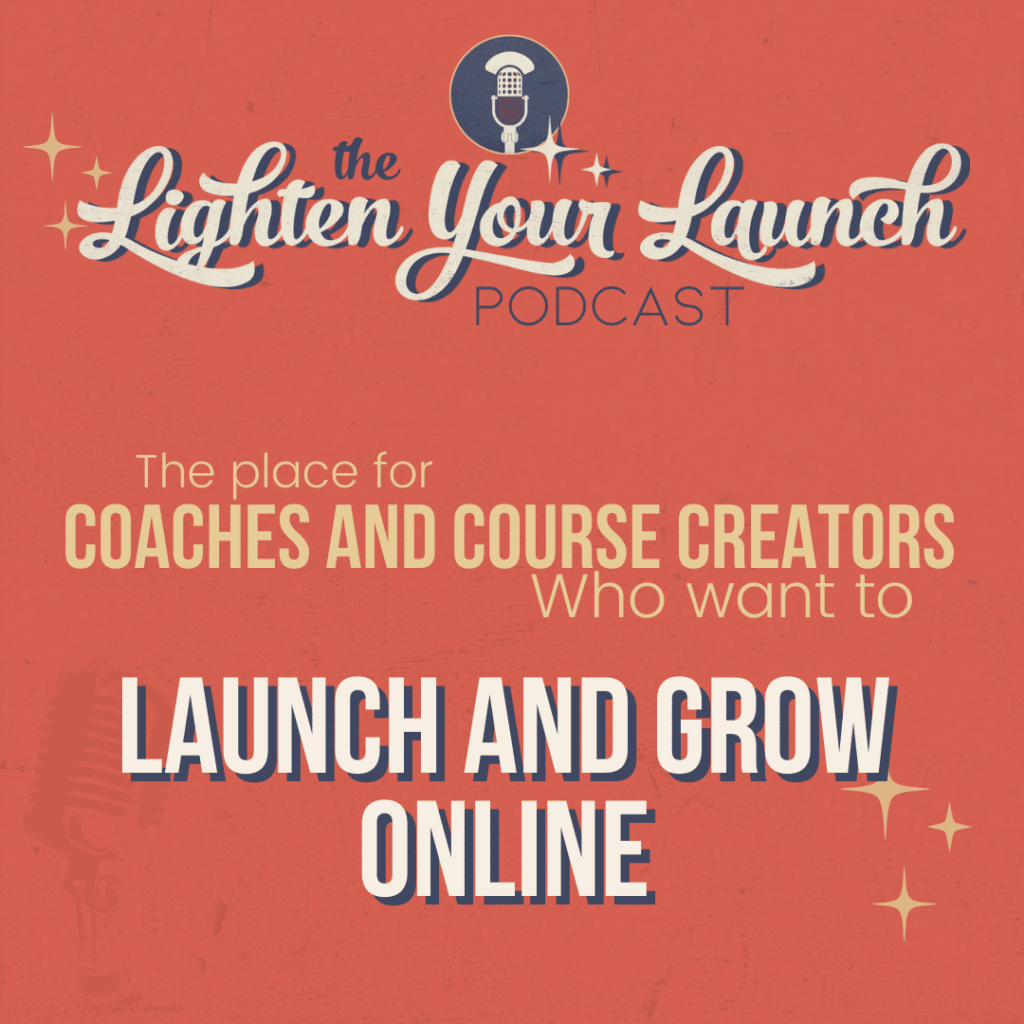
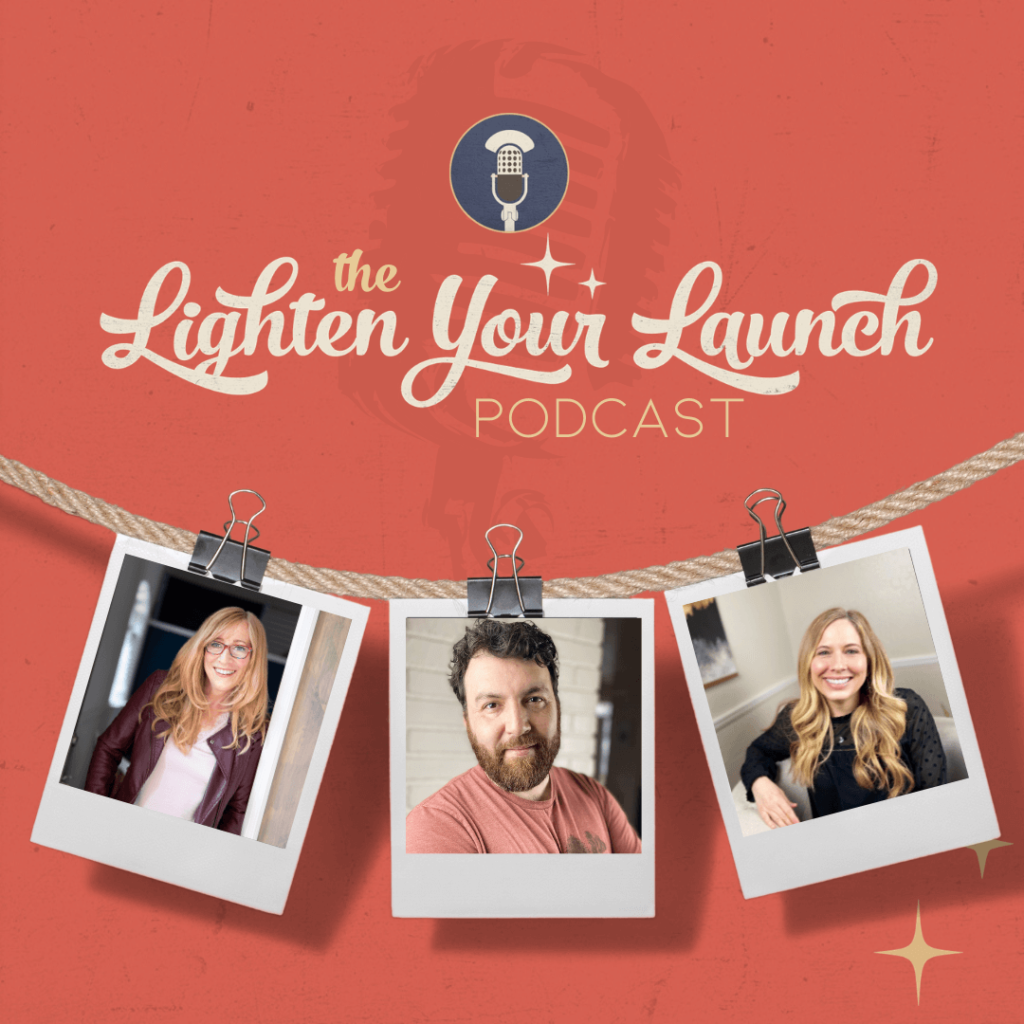


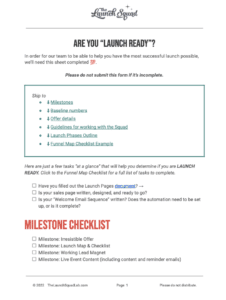
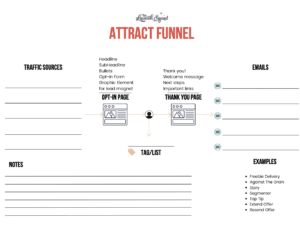
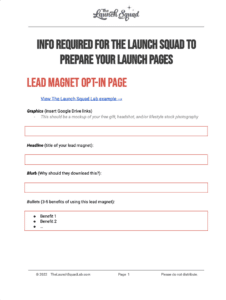
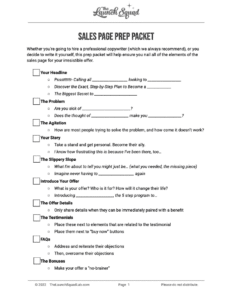
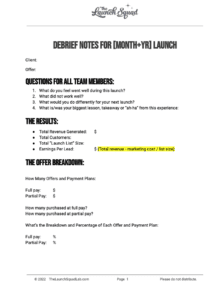
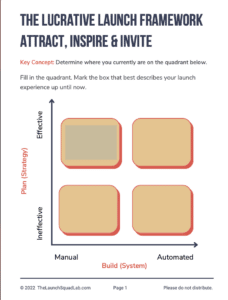
![Marketing Launch Calendar [TEMPLATE]](https://thelaunchsquadlab.com/wp-content/uploads/2023/05/Marketing-Launch-Calendar-TEMPLATE-300x260.png)
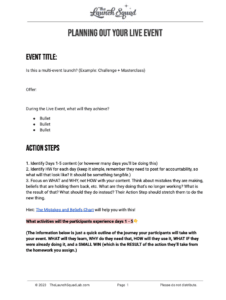
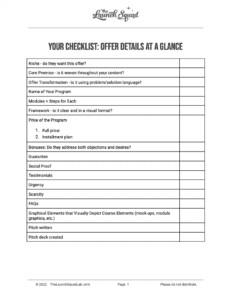
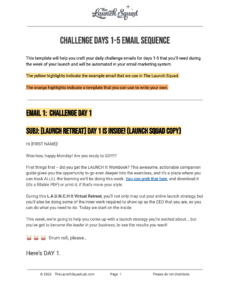
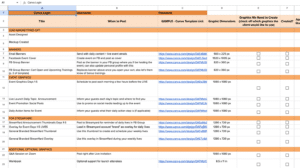
![[Updated] Email Templates for Launch](https://thelaunchsquadlab.com/wp-content/uploads/2023/05/Updated-Email-Templates-for-Launch-223x300.png)
![[REVISED] LS Pitch Script](https://thelaunchsquadlab.com/wp-content/uploads/2023/05/REVISED-LS-Pitch-Script-2023-226x300.png)

